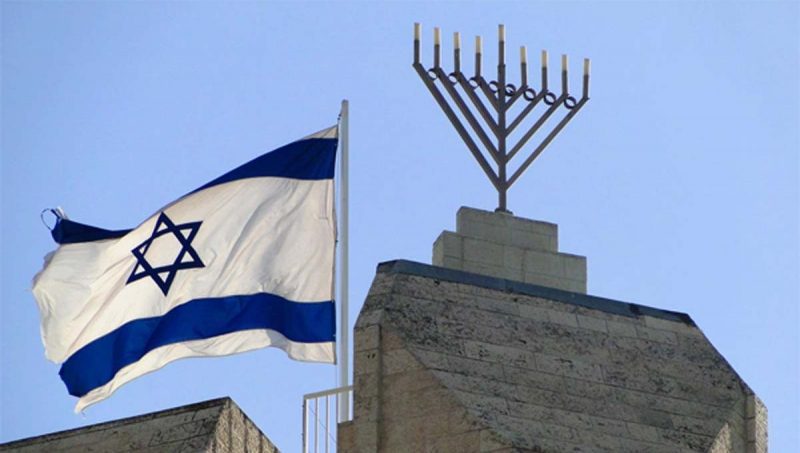Say Goodbye to “the Jewish State”
By Ron Skolnik
In my view, it’s high time to retire the phrase “the Jewish state” and discontinue its use in our Israel conversations. I’ll reiterate: “the Jewish state” should no longer be employed as a synonym for Israel.
No, this is not going to be an anti-Zionist screed and, no, I’m not calling for repeal of Israel’s Law of Return, either.
In that case, you might ask, why do I want to purge such a time-honored term? Because the repeated, reflexive use of “the Jewish state” over decades has facilitated Israel’s steady drift toward illiberalism, particularly under the successive governments of Binyamin Netanyahu.
Yes, I’ll admit, it’ll be hard to see “the Jewish state” go – first of all, because the term is so evocative, calling to mind, as it does, romantic images of Jewish aliya, the popularization and modernization of Hebrew, and Jewish cultural renaissance. Invoking “the Jewish state” also reminds us, reassuringly, that Israel continues to serve as a potential safe haven for Jews, if and when they face persecution in the Diaspora.
I’ll acknowledge, as well, that the term even rests on a sound historical basis. Indeed, the UN Resolution (181) of November 29, 1947 that provided Israel with the foundation of its international legitimacy endorsed a partition of the British Mandate territory into “Independent Arab and Jewish States.” (Never mind, for the moment, that, when the UN made that decision, the population of the area designated for the Jewish entity was less than 60 percent Jewish.)
And, of course, “the Jewish state” is a convenient, colorful sobriquet, allowing speakers, writers, and copy editors to refer to Israel while avoiding repetitious use of the country’s official name.
So what’s the problem with “the Jewish state,” then?
The everyday words and phrases we employ create a mindset, a way of thinking about the world that, over time, becomes ingrained, axiomatic, unquestioned. Social and political norms based on this thinking become ossified. Consequently, one of the paths to effecting social and political change is to highlight and replace terminology that has passed its expiry date.
Take, for instance, the 1960s feminist effort to popularize the term “Ms.” as the go-to alternative to “Miss” and “Mrs.” so that women wouldn’t automatically be defined and categorized by their marital status. For a more recent example, a new guidance to correspondents of The Guardian newspaper by its editor-in-chief is illustrative: Rather than “climate change,” she writes, journalists are encouraged to use the terms, “climate emergency, crisis or breakdown.” Why? Because “[t]he phrase ‘climate change’ … sounds rather passive and gentle when what scientists are talking about is a catastrophe,” requiring an urgent response.
“The Jewish state” is a phrase that similarly needs to be phased out. According to data released by Israel’s Central Bureau of Statistics last month in honor of Independence Day, Israel’s population (including settlers, but not including their Palestinian neighbors in the occupied territories) is, in fact, less than 75 percent Jewish. In other words, “the Jewish state” obstructs our view of the significant minority of citizens who are not Jewish, making them less than fully visible and, when they are seen, implicitly casting them as second-class and less than fully legitimate.
It was within the context of “the Jewish state” that Netanyahu could effectively drive his panic-stricken supporters to the voting booths in 2015 with his now infamous racist call-to-arms: “Arab voters are heading to the polling stations in droves!” Similarly, the lens of “the Jewish state” allowed him to base his campaign this year on a warning that his main rivals, the Blue and White party, would form a government with (gasp!) “the Arabs.”
Let’s put this in an American context. Almost three-quarters of the population of the United States identify with a Christian faith, a recent Gallup poll reported. Just over 75 percent are defined as “White” by the U.S. Census Bureau. How would we react if we were continually bombarded by references to the United States as “the White state” or “the Christian state”? Would this not be considered a threat to the rights of non-Whites or non-Christians?
Indeed, the reference to Israel as “the Jewish state” has been exploited by American White Supremacists as justification of their cause. Frazier Glenn Miller Jr., the former leader of the Ku Klux Klan in North Carolina, argued in his 1999 autobiography, A White Man Speaks Out, that “If the Jews can have a Jewish state of their own, then why can’t we have a White Christian state of our own?” More recently, American neo-Nazi Richard Spencer, among the leaders of the infamous Charlottesville march in 2017, declared that “the most important … ethno-state, the one that I turn to for guidance [is] … the Jewish state of Israel.”
Let me say clearly: In no way do I believe that everyone who uses the term “the Jewish state” is a Jewish supremacist. In fact, I’m fairly certain that most of those who use that expression want Israel’s predominantly Jewish character to be bounded by the demands of liberal democracy and expressed in a manner consistent with the egalitarian guarantees made by the country’s founders.
The problem is that “the Jewish state” is so ambiguous a term, so malleable, so subject to interpretation, that it has been successfully exploited by those in Israel who take it to mean “Jews first” – and sometimes “Jews only.”
Taken to its extreme, for example, a “Jewish state” can, within the bounds of semantics, be defined as a country in which only Jews may live. MK Meir Kahane, later banned from the Knesset, stated during the 1980s that, were he to become prime minister, “not a single Arab” would remain in “the Jewish state” since that was the only way to preserve the country’s Jewish majority.
An only-slightly-less-extreme variant on this concept holds that Jewish statehood equals absolute Jewish dominance – democracy and human rights be damned. MK Bezalel Smotrich, a senior member of the extremist United Right party, a key ally of Netanyahu’s Likud, is pushing a policy based on just such an understanding of the term. Israel, says Smotrich, needs to annex the entire West Bank, impose Jewish supremacy with an “iron hand,” and “help” the Palestinians depart en masse (“[a]s they did in 1948”). “Those who do not go,” he warns, “will either accept the rule of the Jewish state, in which case they can remain, and as for those who do not, we will fight them and defeat them.”
Which brings us back to Netanyahu himself: The prime minister is more attuned to the niceties of pro-democracy discourse, both in Israel and abroad, and, as opposed to the likes of Smotrich, usually tries to tread more carefully so as not to offend. His language, for the most part, is less crass, less crude – especially when he’s speaking English.
Yet, when all is said and done, Netanyahu, too, endorses a two-tiered Israel, with Jewish citizens on top, and he leans heavily on the concept of Israel as a “Jewish state” to rationalize his vision. “This is our state — the Jewish state,” Netanyahu trumpeted at the Knesset last July in defending the new “Nation-State of the Jewish People” law, which has been roundly condemned by an array of pro-democracy groups. The Association for Civil Rights in Israel (ACRI), for instance, in its petition to the High Court to overturn the legislation, argues that the law creates a “hierarchy in status,” with Jewish identity counting for more than Arab identity, thus “subordinat[ing] … the principle of democracy to the Jewish character of the state.”
Having been invoked so often over the years by respected opinion-makers – journalists, politicians and diplomats, clergy, teachers, labor and business leaders – “the Jewish state” phrase has become cozy – familiar and familial, and seemingly innocuous, at least within Jewish circles. And that is precisely its danger, because the term has been weaponized by those in Israel who are promoting a decidedly illiberal agenda.
They deploy “the Jewish state” as rhetorical cover to justify policies that are inconsistent with democracy. They incant it in order to convey false reassurance that the policies pursued under its banner are kosher by default and part of some vague consensus. And when heavier ammo is needed, they summon it in order to besmirch liberal defenders of equality and human rights, branding them as unpatriotic, “anti-Zionist,” “self-hating,” even “treasonous,” all because they oppose the illiberal policies advanced in the name of “the Jewish state.”
We must say goodbye to “the Jewish state,” in other words, not because we want Israel to stop ‘feeling’ or being Jewish. (Besides, that won’t happen, given that demographers project that its overwhelming Jewish majority will actually expand over the next five decades.) No, we need to bid farewell to “the Jewish state” because that language too easily tips the delicate balance between “Jewish” and “democratic” to the grave detriment of the latter.

Ron Skolnik is an American-Israeli political columnist and public speaker, whose articles have appeared in a variety of publications, including Haaretz, Al-Monitor, Tikkun, and the Palestine-Israel Journal.
The views expressed are are not necessarily those of Partners for Progressive Israel





But if we no longer call Israel a Jewish state but continue have laws that ensure Jewish majority, are we not still promoting an illiberal agenda? We don’t call the U.S. a White Christian state, but we also don’t pass laws to ensure that White Christians remain a majority.
But if we stop calling Israel a Jewish state but have laws to maintain a Jewish majority, are we not still promoting an illiberal agenda. We don’t call the U.S. a White Christian state, but we also don’t have laws that ensure White Christians remain a majority.